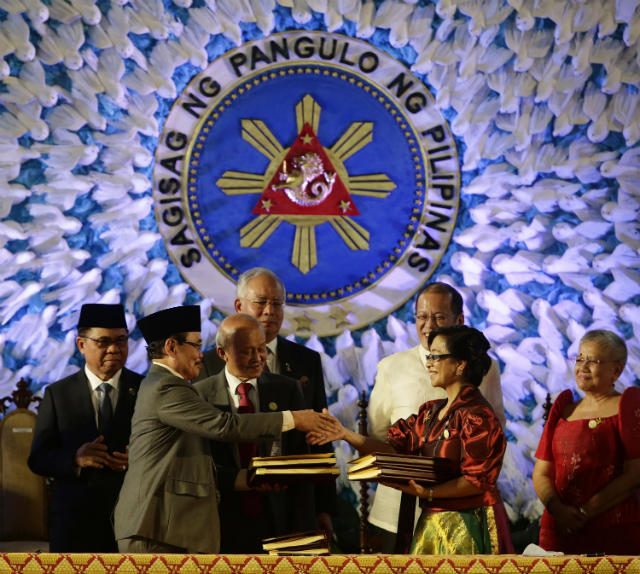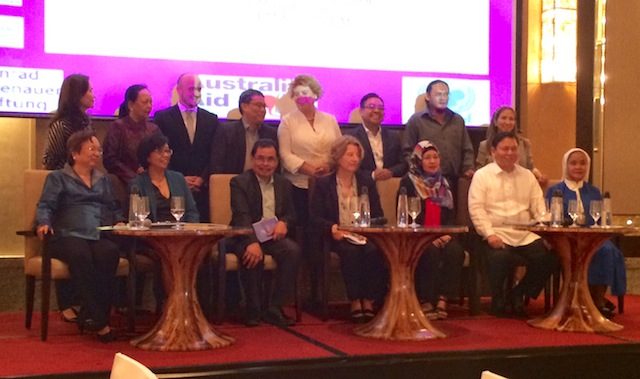SUMMARY
This is AI generated summarization, which may have errors. For context, always refer to the full article.

MANILA, Philippines – Are there other options to achieve peace in Mindanao if the proposed Bangsamoro Basic Law (BBL) is not passed in Congress and ratified in a plebiscite?
The question has been asked by various political observers following the release of a Pulse Asia survey, which found that 44% of Filipinos oppose passing the BBL. The survey was conducted a month after the clash between government and rebel forces in Mamasapano, Maguindanao that killed 44 elite cops, 18 Moro rebels and 5 civilians. (Cheat sheet: The truths and lies of Mamasapano)
Despite negative public sentiment on the BBL as shown in the survey, rebel group Moro Islamic Liberation Front (MILF) chief negotiator Mohagher Iqbal said Monday, March 23, that the MILF would still hold on to the roadmap as agreed in the peace accord signed in March 2014 – that is to pass the law and create the new Bangsamoro autonomous government by 2016.
But the MILF acknowledges the roadblocks along the way, said Iqbal, who also chairs the Bangsamoro Transition Commission, the body that crafted the initial draft of the BBL.
“Personally and officially for the MILF, there is no other option – except the option of peace, except to pass the BBL,” Iqbal said Monday, March 23, during the “Women in the Peace Process” forum in Makati.
“My consistent answer is that I do not answer hypothetical questions because hypothetical questions are endless. However, we have to be very objective because although there is only one option – to pass the BBL – we are not sure if it will pass or not especially if you look at the content of newspapers, even in talk shows, you will be discouraged. Practically 90% of discussions are negative,” he added.
The MILF is foreseeing 3 scenarios in relation to the peace process.
First is that a good BBL would be passed in Congress. Second, that a watered-down BBL would be passed. And third, that the BBL would not be passed at all under the current administration.
What is the best and worst option for the rebel group?
Iqbal said the best scenario, of course, is to pass a “good BBL” while the “next best” option is not to pass the BBL under the Aquino administration and allow the next administration to handle the issue.
The worst scenario for the MILF is for Congress to pass a watered-down BBL, Iqbal said.
“Otherwise we would have accepted the Autonomous Region in Muslim Mindanao. It was offered to us 3 times. More importantly, if the BBL is watered down, it will not address issue in Mindanao,” he said.
A product of the peace deal between the government and the MILF, the proposed Bangsamoro Basic Law aims to entrench a ministerial form of government in Mindanao with greater political and fiscal powers than the current one in place.
House ad hoc committee on the Bangsamoro chairperson, Cagayan de Oro Representative Rufus Rodriguez, has said that the committee is set to delete certain provisions on the BBL.
Rodriguez said the committee considers provisions providing for the creation of autonomous branches of the Commisison on Audit, Commission on Elections, Commission on Human Rights, Commission on Civil Service in the Bangsamoro, among others, as unconstitutional.
Also set to be deleted are provisions giving the future Bangsamoro chief minister operational control over the proposed Bangsamoro police force, which will continue to be part of the Philippine National Police.
These are among the provisions that MILF said would “dilute” the proposed law.
The same issue on how Congress watered down the law that implemented the 1996 peace pact with another rebel group – the Moro National Liberation Front (MNLF) remains to be unresolved up to now. (Read: Past peace pacts haunt proposed Bangsamoro law)
Years since the signing of the government-MNLF peace pact, the rebel group continues to accuse the government on reneging on the peace deal for failing to implement it in full. Their opposition was dramatized in the Zamboanga siege in 2013.
‘Don’t ask us about plan B’
In pushing for the implementation of the peace accord between the MILF and the government, peace officials have said in the past that there is no plan B.
The only plan is to implement the peace deal between the government and the MILF as signed under the CAB, they said.
Following the political fallout on the Mamasapano clash, which has raised continuous questions over the extent of the responsibility of President Benigno Aquino III in the incident, the government’s chief negotiator said there are “always discussions and discussions and discussions on plan B” but the “energies” of the peace panels are still focused on pushing for the BBL.
“I won’t say no plan B but it is something that you prepare for in terms of options. But right now, we’re focused on plan A. So, don’t ask us about the plan B because that will deflect our focus on plan A, which is still to go through with this, to do our best efforts to have a good law by June,” Ferrer said.

Time for an alternative
Peace observers, however, believe it is time to explore other options.
Institute for Autonomy and Governance (IAG) executive director Benedicto Bacani said on Monday an alternative plan should have long been crafted by both sides. IAG is one of the organizers of the forum.
A new plan is most needed, especially as the Mamasapano incident exposed the weaknesses of a peace process that is anchored on the popularity of Aquino as president to be implemented, Bacani said. (READ: Aquino’s trust, approval ratings hit all-time low)
“Let me just describe it. A plan B would essentially be a process that would have general acceptability; a plan B that mitigates the effects of shattered expectations. This plan B can have a potential for building a national constituency which is indispensable in sustainable peace,” Bacani said.
“I’ve always said that we tried to really capitalize on the President’s political capital here – the concept of an instant peace. Mamasapano actually exposed the weaknesses of this process – that you can’t anchor it on a particular person or a particular administration. (We need a) plan B that would focus more on the process,” he added.
The House of Representatives is set to reopen its probe into the Mamasapano clash following a clamor from about 100 of its 290 members, pushing back discussions on the BBL anew.
Congress has set a deadline to put the measure to a vote in the plenary in June. This comes before Aquino’s final State of the Nation Address, and months before the filing of the certificates of candidacy for the 2016 elections in October.
Even if Congress manages to pass the BBL by June, the BBL could still be brought to the Supreme Court over constitutional questions, further delaying the creation of a new entity.
What’s feasible?
What is a feasible plan B should Congress fail to pass the BBL? Advocates say the potential of carrying over the peace process to the next administration should be considered.
Even MILF chairperson Murad Ebrahim said this much in a Reuters interview. Murad acknowledged that the next administration is bound to implement the peace deal should the BBL not be passed on time.
With the 2016 elections fast approaching, advocates of the peace process are pushing to make the passage of the BBL an electoral issue.
But they also admit that the recent Pulse Asia survey showing that many Filipinos, especially in Mindanao (62%), are against the BBL would work against their favor.
Bacani echoed the stand of Presidential Adviser on the Peace Process Secretary Teresita Deles that there should be a massive information campaign on the BBL, especially since a considerable number of Filipinos remain undecided on it. (READ: Public misinformed about BBL, says peace panel head)
But is it not too late for an education campaign now that judgements have been made on the proposed law? Bacani said it would be – if the focus of the campaign is limited to passing it under this administration.
“If you are pushing for the BBL this adminsitration, it would be too late because it’s already in Congress. That should be part of the plan B, this whole information campaign on the BBL. People should be really informed. There are many who have not even read the law. Even those who supported it before Mamasapano, I don’t think they read that,” he said.
With the 2016 elections fast approaching, the debate over the passage of the proposed law – a product of 17 years of negotiations – should now move towards the potential of presidentiables to support the measure.
“That plan B – the issue also is how do you treat the proposed BBL now that would mitigate the negative effects of not passing it – or passing a BBL that is watered down. For example, does it make sense – if it’s really going to be watered down – just don’t pass it because of lack of material time, which is totally understable in the democratic process, in the legislative mill,” Bacani said.
“It’s a legislation that should be discussed more and there’s no more time to do it so you have to do it after… in the next administration,” he added. – Rappler.com
Add a comment
How does this make you feel?
There are no comments yet. Add your comment to start the conversation.